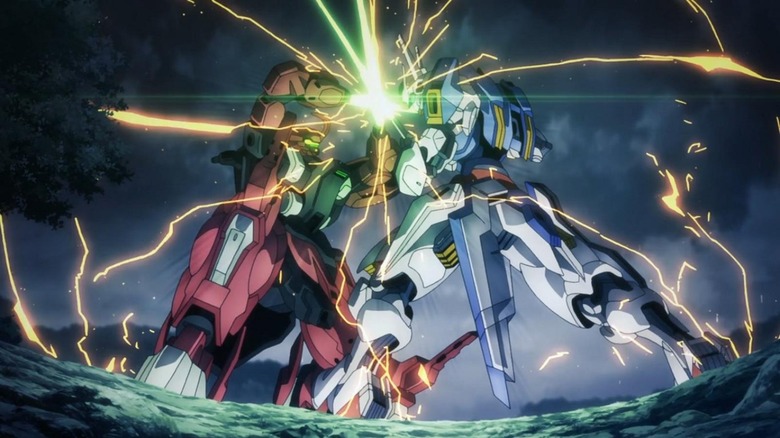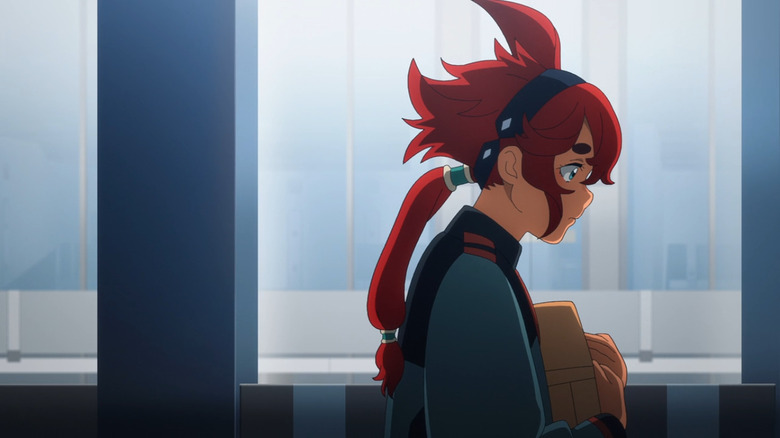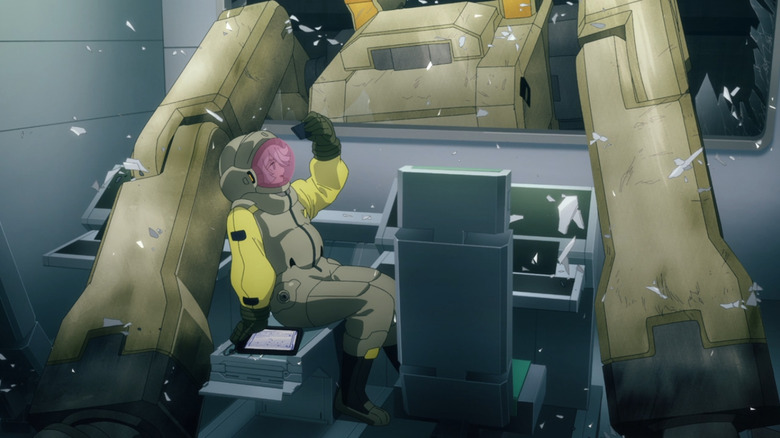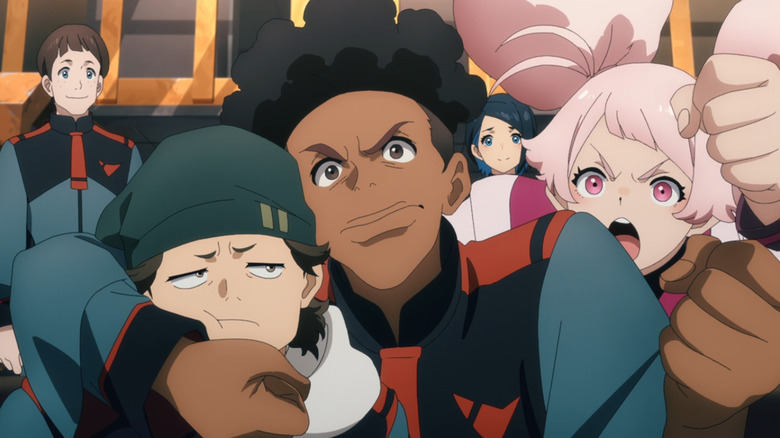The Witch From Mercury Uncovers The Limits Of 'Guel's Pride'
There's a practice in anime fandom called the three-episode rule. The way it works is, if you watch a series for at least three episodes, you'll come away with an idea of what the anime is and whether it is worth continuing. The three-episode rule is rather useless at judging anthology shows like "Space Dandy," or even older series that ran for 52 episodes or more. It's also debatable whether animators or scriptwriters pay any attention to it, or if the rule is a fan-made supposition along the lines of "this episode must have been expensive to make" or "off-model character designs mean bad animation."
Three episodes into "Mobile Suit Gundam: The Witch From Mercury," I'm no closer to knowing if the series will stick the landing at the end. But I do know one thing, which is that right now "The Witch From Mercury" is outrageously fun to watch. There are series airing right now with better animation, more prestigious talent behind the scenes and similarly bonkers premises. But no other anime airing at this moment has me as excited each week to see what will happen next. This is why as much as I appreciate well-done anime adaptations, my heart will always lie with the original series. There's nothing like being surprised, and (for better or worse) scriptwriter Ichiro Okouchi is a veteran at surprising his audience.
It's time to duel
"Guel's Pride," the third episode of "Witch From Mercury," loosely rearranges the events of the third episode. Once again, our heroine Suletta Mercury must duel Guel, the proud young heir of Jeturk Industries, for the hand of Benerit Group heiress Miorine Rembran. But everything else is different this time around. Rather than the pushover that was the first duel, this episode's duel is a knock-down fight that heavily damages both robots. Miorine comes to Suletta's aid once again, rather than allow herself to be saved for a second time. Most importantly of all, Guel is not allowed to fight on his own this time. The Jeturk family has decided that Guel will win at all costs, and if that means removing his agency in the bargain, so be it.
I'm impressed by how much this episode made me feel for Guel, considering his rude behavior when he was introduced. Like Saionji in "Revolutionary Girl Utena," Guel is a natural bully convinced of his own strength. Guel doesn't even have the influence of resident Ohtori Academy bad boys like Touga or Akio as an excuse for his own misbehavior. But he is given a rather rude awakening by his family in this episode when he discovers that the fighting skills he prides himself on don't actually matter. His dad Vim doesn't just exchange his stylish purple MD-0032G customized Dilanza for a terrifying red MD-0064 Darilbalde, a whirlwind of drone arms, shields, and laser swords. He installs software in the cockpit so that Guel doesn't even need to touch the controls; the robot will effortlessly pilot itself. He even has his people tamper with the sprinkler systems inside the battle arena to interfere with Suletta's laser beams.
Adults must die
Guel is angry and embarrassed that his family would interfere to such an extent, but his dad doesn't care. As far as he's concerned, Guel is a child with no agency, and ought not to expect any until he becomes an adult. Guel might be a strong, handsome guy who uses his patriarchal privileges to take what he wants and hurt people he doesn't like. But outside of Asticassia School of Technology, he's just another bargaining chip like his former fiancee Miorine. The dueling system provides a measure of heady power to young teenagers training to succeed their rich, corrupt parents. But if those teenagers don't want to become their parents, they're out of luck. When adulthood is defined as "living comfortably and complicitly within a carnivorous capitalist system," to imagine an alternative is immature.
This to me is reminiscent of "Revolutionary Girl Utena," which repeatedly asked the question of what true maturity or "adulthood" looks like. Utena finds power in the end not by accepting the illusory prince hood represented by Ohtori Academy's headmaster Akio, but by opening her friend's thorn-bound coffin with her own bleeding hands. But then, the distrust of adults demonstrated in "The Witch From Mercury" is just as rooted in the original "Mobile Suit Gundam" and its sequels. Amuro and his young friends on White Base must fight the villainous Principality of Zeon, but just as villainous is the notion that children and teenagers should have to fight at the behest of adults at all. Before the students of Asticassia are able to build a world without war, they first have to be able to imagine one.
Never count out Suletta Mercury
The key to all of this is Suletta Mercury, the heroine of "Mobile Suit Gundam." In part because she is a chaos agent who earns Miorine's respect, mystery boy Elan Ceres's interest and (hilariously) Guel's love. But also because of the students we've met so far, she alone trusts her parents without reservation. Suletta believes her mother to be her closest friend, rather than a calculating authority figure. Unfortunately, the audience knows that Prospera has the Char mask, and almost certainly intends to wreck Suletta's new world beyond all recognition. The parents of Asticassia's children likely deserve it, of course. But do the children? It remains to be seen.
As concerned as I am for Suletta, though, I would never count her out. Despite having no social skills to speak of, she's a talented robot pilot with unshakable confidence, and completely guileless to boot. When Guel takes back control of his Darilbalde at the end of the fight and makes a fierce counterattack, Suletta recognizes his talent as a pilot even as she is able to pull a tight victory. She ends the duel not by laughing at Guel while he's down, but by telling him honestly that he fought a good battle. It's no surprise in hindsight that Guel, an immature teenager who talks a good game, falls for her immediately. How many more people will Suletta be married to by the end of the series? Are Kobayashi and Okouchi mad enough lads that we are heading towards a polycule ending? I'll be keeping a running tally of Suletta's romantic interests from this point forward.
This week's addendum
Suletta's List: In this episode, Suletta says that her hopes and dreams for school are to make friends, call them by nicknames, exchange contact information, study in the library, eat lunch on the roof and go on a date. This episode she's made friends and echanged contact information; unfortunately, the nickname didn't stick. Will she go on a date next episode? We'll just have to see!
Suletta's Other List: Suletta is engaged to Miroine, has been proposed to by Guel. Has Elan's interest. Loves her robot Aerial.
The Suletta and Miorine Power Hour: Miorine allows Suletta into her greenhouse, an honor she has given to few others. Suletta tries to give Miorine the nickname "Mio-mio," but is soundly rebuffed. Perhaps she'll come around, or maybe we'll see more ridiculous nicknames for Miorine in future episodes.
The Robot Watch: I'm not a robot expert, but I thought that MD-0064 Darilbalde had a great design. I particularly liked the way that its detachable drone parts can be repurposed as arms and shields depending on the situation. Considering that the Darilbalde and the Aerial both rely on remote drone technology, though, I wonder if future robots will work similarly. The high technology appeal of these robots is very different from earlier "Gundam" series "Iron Blooded Orphans," which emphasized physical weapons and bullets over laser beams.
The Utena Corner: Guel is slapped hard by his dad in this episode, a longstanding tradition in both "Utena" and "Gundam." Plus, Suletta visits the Duelling Committee's chamber in an elevator.
Friends of Gundam: Anime flower language expert Emily Rand wrote a great piece about the "Utena" connection and potential flower language in "Witch From Mercury," and another one about the show's connections to "The Tempest."




